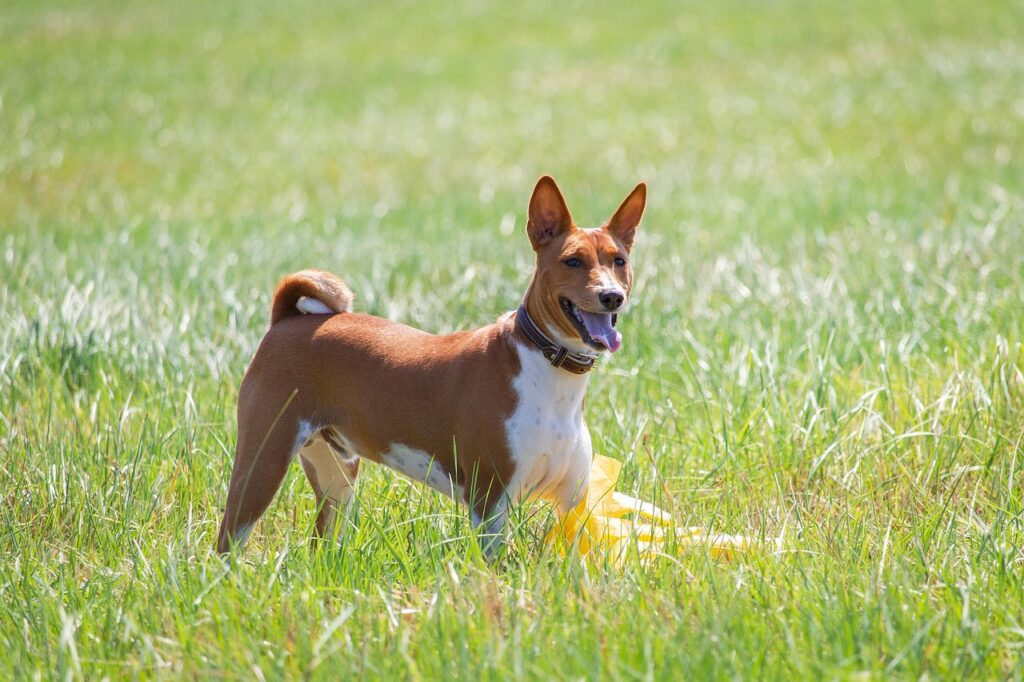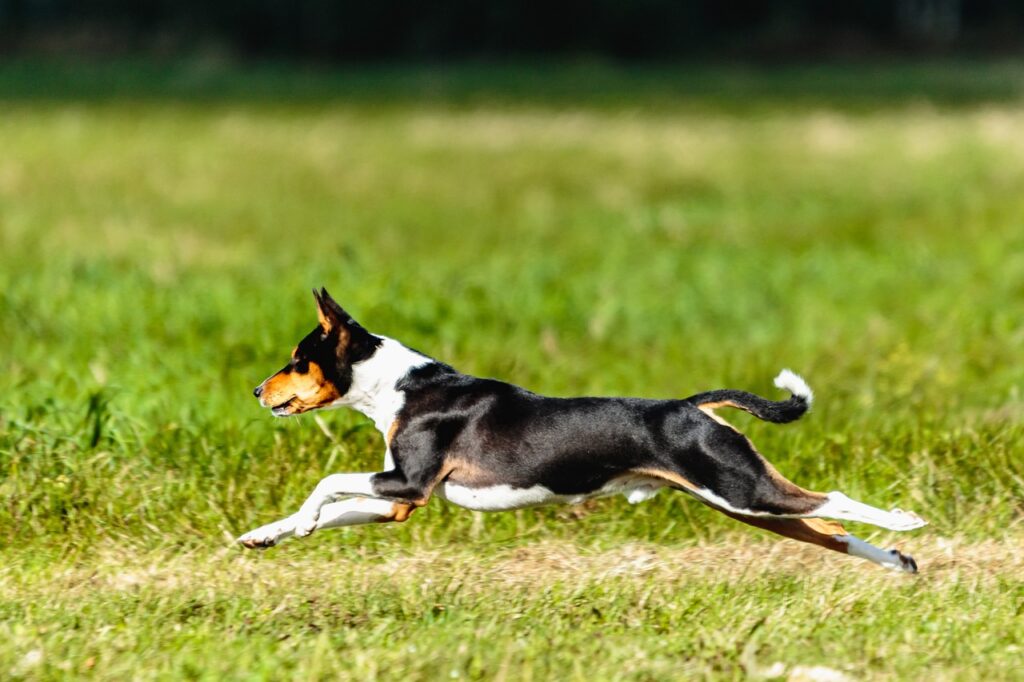The Basenji is a unique and intelligent dog breed known for its independence, agility, and cat-like grooming habits.
Table of Contents
Introduction to the Basenji Dog Breed!
The Basenji is a small to medium-sized hunting dog that originates from Central Africa. Known for its intelligence, agility, and unique vocalizations, this breed is often referred to as the “barkless dog.” Instead of barking, Basenjis produce a distinctive sound often described as a yodel. They are highly independent, energetic, and affectionate with their families. Their sleek, short coat, erect ears, and tightly curled tail give them a distinctive and elegant appearance.

Caring for a Basenji Dog Breed
Owning a Basenji requires commitment and dedication. Here’s what you need to know to keep your Basenji happy and healthy:
Exercise and Activity
- Basenjis thrive in active households and enjoy interactive play.
- Regular exercise is essential to prevent boredom and destructive behavior.
- Activities like agility training, long walks, and running in a secure area are ideal.
Mental Stimulation
- Basenjis are intelligent and curious, requiring mental challenges to stay engaged.
- Interactive toys, puzzles, and scent games are great ways to keep them entertained.
Basenji Health Issues
While Basenjis are generally healthy, they are prone to certain genetic conditions. Being aware of these can help you provide the best care:
Common Health Problems ( Basenji Dog Breed)
- Hypothyroidism: A condition where the thyroid gland doesn’t produce enough hormones, leading to weight gain, lethargy, and coat issues.
- Fanconi Syndrome: A genetic kidney disorder that affects nutrient reabsorption, requiring lifelong management.
- Progressive Retinal Atrophy (PRA): A degenerative eye disease that can lead to blindness.
- Hip Dysplasia: A condition where the hip joint doesn’t fit properly, causing pain and mobility issues.
- Immunoproliferative Systemic Intestinal Disease (IPSID): A digestive system condition that causes malabsorption and weight loss.
Preventative Care
- Regular vet checkups are crucial to monitor and manage these conditions.
- Early detection can significantly improve the quality of life for your Basenji.
Feeding a Basenji Dog Breed
A well-balanced diet is essential for maintaining your Basenji’s health and energy levels.
What to Feed
- High-quality dog food rich in lean proteins (chicken, fish, or beef).
- Include omega-3 fatty acids for a healthy coat and skin.
- Avoid artificial additives and fillers.
How to Feed
- Feed your Basenji at consistent times daily.
- Use portion control to prevent obesity.
- Always provide fresh water to ensure proper hydration.
Nutritional Tips
- Offer fresh fruits and vegetables as healthy treats.
- Monitor their weight and adjust portions based on activity level and age.
- Typically, Basenjis require 1-2 cups of high-quality dog food per day, divided into two meals.
Basenji Dog Breed Behavior and Training
Personality and Temperament

- Basenjis are intelligent, curious, and independent.
- They form strong bonds with their owners but can be reserved with strangers.
- Their playful and energetic nature makes them excellent companions for active families.
Training Tips
- Early socialization and obedience training are essential.
- Use positive reinforcement methods, as Basenjis do not respond well to harsh discipline.
- Crate training can help manage their independence and prevent destructive tendencies.
Fun Activities
- Agility training and canine sports like lure coursing.
- Fetch, scent games, and interactive toys.
- Long walks, hikes, and running in a secure, fenced area.
Basenji Grooming Guide
Skin Care
- Basenjis have low-maintenance skin. Bathing once every few months is usually sufficient.
- Avoid harsh shampoos to maintain natural oils.
Coat Care
- Their short coat requires minimal grooming. Weekly brushing helps remove loose hair and keeps the coat shiny.
- Use a damp cloth for occasional wipe-downs.
Eye Care
- Clean their eyes regularly with a damp cloth to prevent infections.
- Watch for signs of irritation or excessive tearing.
Ear Care
- Check their ears weekly for dirt and wax buildup.
- Clean with a vet-approved ear cleaner when necessary.
Nail Care
- Trim their nails regularly to prevent overgrowth and discomfort.
- Long nails can affect their gait and cause joint issues.
Considerations for Pet Parents
Cost of Owning a Basenji
- A Basenji puppy from a reputable breeder can cost between 1,200to1,200to2,500, depending on lineage and location.
- Adopting from a rescue may be a more affordable option.
Exercise Needs
- Basenjis are high-energy dogs that require at least 60 minutes of exercise daily.
- Without enough exercise, they can become restless and develop destructive behaviors.
Vocalization
- Basenjis do not bark traditionally but may yodel, howl, or whine to express themselves.
- They communicate through body language and unique vocalizations.
Family Compatibility
- Basenjis can be excellent family pets for active households.
- They may not be ideal for families with small pets due to their strong prey drive.
- Socialization and training are key to ensuring a well-behaved companion.
Is a Basenji Right for You?
Before adopting a Basenji, consider their unique traits:
- They thrive in homes with active owners who can provide proper training and exercise.
- They may not be the best choice for first-time dog owners due to their independent nature.
- For the right owner, Basenjis make loyal, loving, and entertaining companions.





